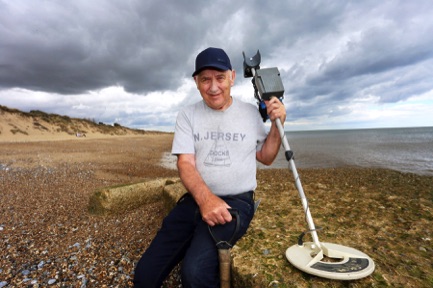Buried treasure in the sand
© All content copyright
winterton-on-sea
THERE’S buried treasure under the sand at Winterton and if anyone’s going to find it Kenny Chaney has a pretty good chance.
He’s been beachcombing for more than half a century and his finds have ranged from ancient coins, Second World War bombs to expensive jewellery. In fact he’s often called in when holidaymakers find they’re missing an important ring or watch after coming off the beach.
He started out in the 1960s when metal detectors were very basic. “They didn’t have to be very good. In those days you found a tremendous amount of coins. One day I found 411. They were all old,” he said.
He bought his first detector in 1962. It cost £52 and six shillings – a not insignificant amount in those days. His father was not impressed. “He said: ‘What are you going to do with that, boy?’ I went down the beach that night and came home with £3 in money.”
By the end of the week he had uncovered three gold rings lost for years and his machine had paid for itself. Realising Kenny was onto a good thing his dad and his uncle both bought metal detectors a couple of days later.
Over the years his hobby has brought rich pickings out of the sand and fields belonging to friendly farmers – hoards of coins dating back 500 years or more, Bronze Age axes and spearheads. Some are proudly displayed in the landowners’ homes, some have been declared treasure trove.
For Kenny it’s the thrill of the find that matters more than the money. “When you find something good, especially in the fields if you pick up a silver coin, you wonder about the last person that held it and how that coin could have lain there all that time when the field has been ploughed so many times.
“I’ve had silver coins from the time of Henry III and Henry IV that you think could have been just minted. It’s marvellous really.”
Modern coins, with poorer quality metals, are less likely to draw the admiration of future metal detectorists. The £1 pieces that Kenny finds tend to be in bad condition.
But his search skills are still in demand. Only recently was called in to help a visitor who had lost signet ring that held huge sentimental value. “I went down at 5am on the Sunday morning where she walked down,” he said. “I went backwards and forwards, covering the beach in sections and on the third go I got it.”
She was so grateful she sent him a thank you card with a heartfelt message.
In it she wrote: "It's so important to me as in the family tradition I got it when I turned 21.
"I really wasn't holding out much hope. So waking up this morning to a message saying it's been found truly made my day."
She told Kenny: "It's restored my faith in humanity too, so thank you so much."
He doesn’t know how many lost items he’s found over the years. Often the problem is people don’t really remember where they were when their possessions went missing. Kenny’s found rings hundreds of yards away from where he was asked to look.
Once he spent five early mornings and evenings searching for a holidaymaker’s lost ring, without success. “The chap came down on the Friday night and said: ‘I don’t know how to tell you this but the wife found the ring. It was behind the soap dish in the chalet’."
Sometimes his determination has paid off in the nick of time. A holidaymaker who lost a £2,500 platinum ring identical to his wife’s, was on his way to Heathrow when Kenny broke the good news to him. He’d spent three days searching and found it when he decided to have one last go.
Some of his finds have more than monetary value though. He saves all the metal toy cars he finds for his young grandson.
